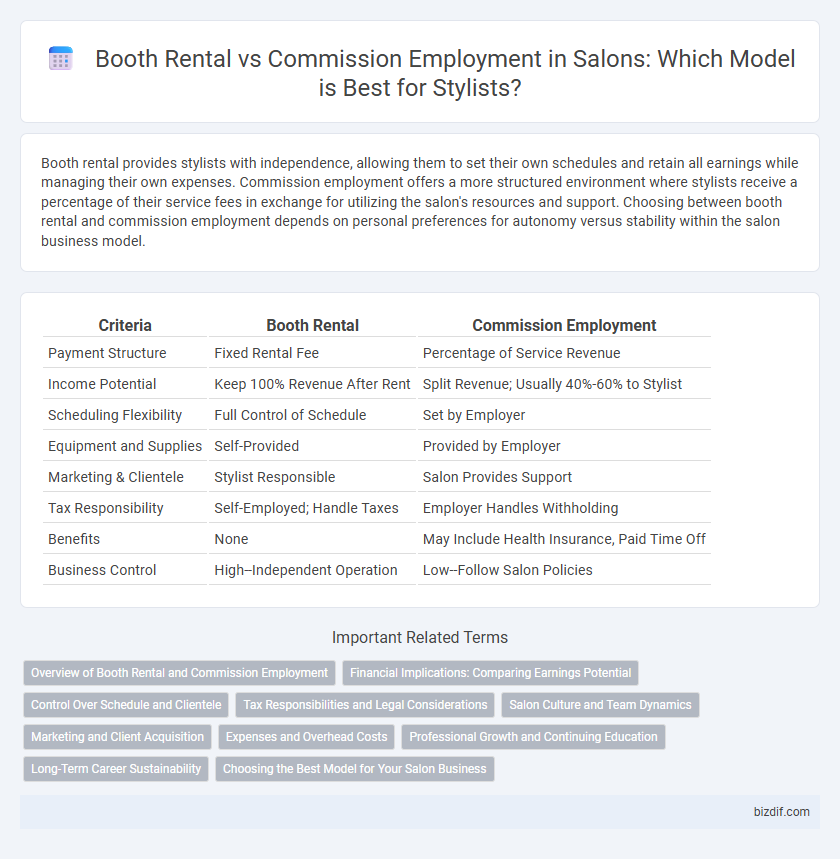Booth rental provides stylists with independence, allowing them to set their own schedules and retain all earnings while managing their own expenses. Commission employment offers a more structured environment where stylists receive a percentage of their service fees in exchange for utilizing the salon's resources and support. Choosing between booth rental and commission employment depends on personal preferences for autonomy versus stability within the salon business model.
Table of Comparison
| Criteria | Booth Rental | Commission Employment |
|---|---|---|
| Payment Structure | Fixed Rental Fee | Percentage of Service Revenue |
| Income Potential | Keep 100% Revenue After Rent | Split Revenue; Usually 40%-60% to Stylist |
| Scheduling Flexibility | Full Control of Schedule | Set by Employer |
| Equipment and Supplies | Self-Provided | Provided by Employer |
| Marketing & Clientele | Stylist Responsible | Salon Provides Support |
| Tax Responsibility | Self-Employed; Handle Taxes | Employer Handles Withholding |
| Benefits | None | May Include Health Insurance, Paid Time Off |
| Business Control | High--Independent Operation | Low--Follow Salon Policies |
Overview of Booth Rental and Commission Employment
Booth rental offers salon professionals the autonomy to manage their own schedule, pricing, and client base while paying a fixed rent for their workspace, fostering independence and entrepreneurial growth. Commission employment provides stylists with a stable income and regular clientele through a percentage-based pay model, often including benefits and reduced business overhead. Understanding the financial implications, flexibility, and control differences between these arrangements is crucial for salon professionals when choosing the best fit for their career goals.
Financial Implications: Comparing Earnings Potential
Booth rental offers stylists complete control over their earnings, allowing them to retain 100% of their generated revenue while managing their own expenses such as supplies and rent. Commission employment provides a steady income through a percentage of each service, reducing financial risk but limiting overall earnings potential due to the salon's share. Evaluating fixed costs, variable expenses, and income stability is crucial for stylists to maximize profitability based on their client base and business goals.
Control Over Schedule and Clientele
Booth rental offers salon professionals complete control over their schedule, allowing flexible appointment times tailored to personal preferences and client availability. In commission employment, stylists typically follow the salon's predetermined hours and policies, limiting flexibility but providing consistent client flow and support. Choosing booth rental enhances autonomy in managing clientele, whereas commission roles rely more on the salon's established customer base for bookings.
Tax Responsibilities and Legal Considerations
Booth rental offers salon professionals greater tax deductions by classifying them as independent contractors responsible for self-employment taxes, requiring accurate quarterly estimated tax payments and thorough record-keeping of business expenses. Commission employment classifies stylists as employees, with salons withholding payroll taxes and providing W-2 forms, simplifying tax filing but limiting deductions to standard employee expenses. Legal considerations include compliance with labor laws; booth renters must manage licenses and permits independently, while commissioned employees benefit from employer-covered workers' compensation and unemployment insurance.
Salon Culture and Team Dynamics
Booth rental fosters entrepreneurial independence within a salon, allowing stylists to build personal brands but potentially limiting collaboration. Commission employment promotes a cohesive salon culture where team dynamics thrive through shared goals and collective support. Balancing autonomy and community impacts overall productivity and client experience in salon environments.
Marketing and Client Acquisition
Booth rental offers stylists full control over their marketing strategies and client acquisition, allowing personalized branding and direct management of promotional efforts. Commission employment provides salon-supported marketing channels and a built-in client base, reducing the time and cost required to attract new customers. Understanding the impact of these models on client growth is essential for stylists aiming to maximize revenue and build sustainable professional networks.
Expenses and Overhead Costs
Booth rental in salons typically involves fixed monthly fees, shifting expenses like product costs, supplies, and marketing directly to the stylist, enhancing control over overhead but increasing personal financial responsibility. Commission employment reduces upfront expenses as the salon covers product and facility costs, while stylists pay a percentage of their earnings, resulting in less variable financial risk but potentially lower net income. Comparing booth rental and commission employment highlights the trade-off between managing overhead costs independently versus sharing expenses with salon management.
Professional Growth and Continuing Education
Booth rental offers stylists independence to tailor their schedules and client base, fostering entrepreneurial skills essential for long-term professional growth. Commission employment provides structured environments with built-in access to continuing education and mentorship programs, accelerating skill development and industry knowledge acquisition. Choosing between booth rental and commission roles depends on whether a stylist prioritizes autonomous business management or guided educational opportunities for career advancement.
Long-Term Career Sustainability
Booth rental offers stylists autonomy to control their schedule, pricing, and client relationships, fostering long-term career sustainability through entrepreneurial growth. Commission employment provides consistent income and benefits, supporting financial stability but limiting income potential and independence. Choosing between booth rental and commission employment depends on individual priorities for flexibility, earning potential, and career longevity in the salon industry.
Choosing the Best Model for Your Salon Business
Booth rental allows stylists to have full control over their schedules and earnings, paying a fixed fee to the salon, which can maximize profit potential while minimizing salon liability. Commission employment offers the salon more control over service pricing and quality standards, with stylists earning a percentage of their sales, fostering consistent income for both parties. Evaluating your salon's goals, financial stability, and management preferences will help determine whether a booth rental or commission model aligns best with your business strategy.
Booth Rental vs Commission Employment Infographic

 bizdif.com
bizdif.com